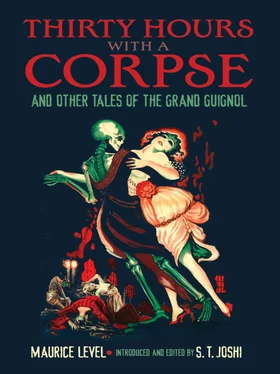“Don’t worry,” repeated Fanjard.
Then he went away.
At this moment the director passed by. He asked with a pleasant smile:
“Well, how does it go? Are you satisfied?”
“Satisfied? My dear man, my piece is ruined—you understand, ruined. Mlle. Ravignan is passable. The light effects are a fizzle; Fanjard is bad, bad, bad!”
The director tried to calm him. He had heard many others talk that way, and he knew that in the theatre, better than anywhere else, everything somehow works out. Fanjard was an artist, sure, conscientious, incapable of slighting his roles, let him play them two hundred times. Obstinate? Yes. Unequal at rehearsals? Possibly. But exceeding all expectations when the curtain went up.
The author, still skeptical, shook his head.
“Let’s wait and see, my dear master,” the director protested. (And when a director thus addresses an author who has only a vague claim to such a title, he is using his ultimate argument.) Let’s wait and see. Have more confidence. I am as much interested in the success of your piece as you are. Don’t get worried yourself—and don’t worry him. He is so-so now, perhaps; only so-so. But he will be superb. That I guarantee you.”
* * *
The first night arrived.
In the back of a box, alongside the director, the author listened to his play. The first part of it was a torture. With each spectator who entered late, with each seat slammed down, he had the feeling that humanity in general was in a conspiracy to ruin him. Yet the director kept whispering to him:
“It’s a go. It’s a go.”
After the first curtain he wanted to go up to the dressing rooms and give some last suggestions to the actors. But the director dissuaded him.
“Let them alone. Don’t bother them. Believe me, it will be a success.”
The second act had a succès d’estime, and the curtain rose for the third act. Fanjard finally appeared, descending the staircase with an air of nobility. Mlle. Ravignan stretched out her arms toward him. He stopped her with a gesture and said, “What is it?” And then, in a low tone, “Your brother? My son?” She bowed her head, and he, just as at the rehearsals, without a cry, without a sob, began his set speech.
Clinging to the arms of his velvet-covered seat, arching his shoulders, the author growled out, as if he thought he could communicate his own fire to the actor:
“Let go! Let go! Let go!”
But Fanjard continued to the end in a colorless voice. While the curtain descended amid merely courteous applause, the author ran to the wings. The fury which he had held back for eight days nearly strangled him. Fanjard was returning to his dressing room.
“Well, are you satisfied?” the author shouted at him. “You have wrecked my play. Yes, you were going to reserve yourself for the first performance! You should have talent, my dear sir, before you have genius. Effects are not improvised. They are produced by hard work. And, besides, what a role you had! What a scene! A scene to raise the house. A father, a father, who has only one love, one joy in the world—his son. They tell him of his son’s death, and you stand there tranquil, half stupefied! I declaimed the scene, even in writing it. I shouted it.”
Then the old actor answered softly, without anger, without indignation, without any show of wounded pride:
“You are wrong, monsieur; and that is because, fortunately for you, you don’t know. I learned only four hours ago of the death of my son, killed at Craonne; and I did not cry aloud then any more than I do now.”
ALTHOUGH HE was a colonel, a Prussian baron, a veteran officer of the Guard and the possessor of a castle on the banks of the Rhine, at which His Majesty the Kaiser had once stopped for a few hours, in other respects this Boche had a spirit rather generous for a Boche.
Having served two years at Paris as an embassy attaché, he recalled that sojourn with infinite graciousness, and never advertised more than was necessary the fact that he had spent two other years in the same city as an employee in a little restaurant near the Champ-de-Mars, frequented by orderlies of the officers of the École de Guerre. In this capacity he had acquired a real respect for the French soldier—for his discretion and the affectionate attachment which he bears his chiefs.
Certainly, war seemed to him a legitimate thing. But he practiced it, to use his own expression, “in a chivalrous manner.”
In the house that he occupied he would have felt himself at fault if he had not left his card once a month on his involuntary hostesses, if he had not sent them invitations, with a program, for the military musicals, and, on Sedan Day, a card for the review. At that, he was astonished that these ladies were not more appreciative of such delicate attentions.
In the line of service he showed himself strict (as was proper), but not brutal. He went so far as to speak to the under-officers as if they were almost human beings, and, in the evening, on the Mall, to converse with lieutenants who were neither noble nor long connected with the army (the war had so decimated the ranks of the others!). He even struck up a friendship, so to speak, with one of these, an attractive fellow, obsequious, correct, well educated, too, for an ordinary plebeian. With him the colonel talked freely and confidentially.
“When we shall have won the war I should like to live in Paris again. It is a very agreeable city. The Bois de Boulogne is exquisite at all seasons of the year; the theatres show excellent taste, and the women are charming.”
“I was highly delighted with the visit I made there in July, 1914,” answered the lieutenant. “One can do business easily, the people are hospitable, and, if one wishes to live the sort of life there that he lives at home, our compatriots are so numerous that, in the evenings, we can gather together just like a family. I speak of conditions before the war, of course.”
“Before the war! Before the war!” repeated the colonel a little abstractedly. “I feel that after the war all that will be considerably changed. Sometimes I read the Paris newspapers, and I am pained to see what a hostile feeling there is against us. The devil! War is war. We did not wish to make war, did we? We were forced to make it.
“Our superiority in all branches of human activity is such that no people can resist us. That is a fact. Why don’t the French admit it? Since we are the most cultured nation on earth—the chosen people, you might say—why don’t they let themselves be guided by us? We should realize great things together. But there the old Latin obstinacy comes in. How regrettable it is on their part! For—I tell you this between ourselves—I am very fond of the French.”
“So am I, Colonel.”
Thus exchanging ideas they regained the town, where in the twilight the demolished houses stood out jagged against the sky, since the horizon was lighted everywhere with conflagrations. The colonel sighed:
“Look at that. Don’t you believe that it cuts a sensitive German to the heart to see such a spectacle? There is the farm with the big mill on it—a fine farm, a perfect milling establishment, a magnificent investment. But it will all be in ashes tomorrow. Whose fault will that be?”
“It is war,” the lieutenant suggested, urbanely.
“Indispensable destructions, which the superior interest of our armies amply justifies. That is another thing which the French fail to understand.”
“Yet it is all very simple.”
The colonel threw away his cigar, which had gone out, stopped and lifted his finger.
“Under all circumstances, Lieutenant, remember this,” he said. “It may be that for strategic reasons we shall abandon this country. Let us root up the roads, destroy the bridges, turn the streams out of their courses, fell the trees and throw them across the highways—let us do everything, in a word, which the security of our armies requires. But let us commit no depredations on the inhabitants. For myself, I intend to set an example. In the house in which I live I shall see to it that nobody touches anything. In proportion as you have found me paternal and considerate, you will find me, if my orders are not scrupulously obeyed, a man of iron.”
Читать дальше












